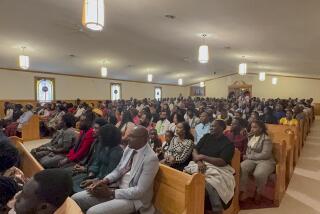Haitian quake victims wait in the shadow of international aid
- Share via
Reporting from Port-Au-Prince, Haiti — Even by Haiti’s post-earthquake standards, the little encampment on an expanse of grass next to the airport is a jarring sight. No more than 100 people strong, established beneath sheets lashed to branches driven into the ground and with a red SUV parked in its midst, it is a sign of the lengths people will go to in their search for a safe place to settle.
It also sits less than half a mile from thousands of tons of medical supplies, food, water and other assistance that are pouring into Port-au-Prince’s airport. Helicopters ferrying aid thunder low overhead as they approach the tarmac just across a wall from the grassy camp. A well-worn footpath stretches to the airport, where the U.S. military has set up.
But until those in charge figure out how to distribute it, all that emergency aid remains out of reach for those living almost under the flight path.
“I’m not angry, but we are impatient,” said Yves Petit Phard, the designated camp coordinator. The camp has not only a coordinator but also a name: Cahemaga.
Petit Phard said the camp was almost out of food, and he didn’t know where the night’s dinner would come from. Where, he asked, was the help that had been promised?
For now they wait, as crowds tramp past on their way to the airport, and vehicles streak by on the busy road that lies just across the sewage-choked gully.
“This is the only place we could find to sleep,” Petit Phard said, explaining why they had chosen this spot. Most of the people at Cahemaga lived nearby in homes that were not flattened by the quake, but were damaged so badly that they are no longer habitable. They considered moving into a sprawling camp that sprouted across from the airport terminal but decided it was too crowded, and not safe.
“We’re church people,” said Gregory Branchedor, the camp’s assistant coordinator. “All the other places are bad. They smell.”
Untold thousands of displaced in Port-au-Prince are living in abhorrent conditions, often surrounded by rubble reeking of decaying bodies. Here in Cahemaga, at least, you can find a cool, quiet place to relax, as one elderly man in a pinstriped shirt and tie was doing on Monday in the stifling afternoon heat. A billboard advertising cellphones provided shade as he sat in a plastic chair, drinking coffee from a stainless steel mug and munching on a piece of bread while taking in the breeze.
He had come to visit Sonia Marcel, who with her son Lys had settled here along with about 35 orphans they say they care for. The children were nowhere to be seen -- they had gone down the road where, rumor had it, food was being distributed.
Sonia was having her toenails clipped in the shade of the billboard, her large foot being gently handled by a woman in a torn white tank top. Lys, an attorney, was inside one of the makeshift tents watching over his younger brother, Ulyse, a mentally disabled 21-year-old who dozed on a mattress clutching a teddy bear and small doll.
“We’re here because the people are afraid the building could fall,” Lys Marcel explained when asked why they had taken the children away from the orphanage, which survived the quake. “We think this is the only safe place we can be for the time being.” He owns the red SUV parked amid the tents. It ran out of gas days ago.
Occasionally, trucks carrying water pull over and expend some on the people of Cahemaga. Most of the people here brought food from their homes, and not all of it is gone yet. On Monday afternoon, a woman was stirring a huge pot of beans at one of the tents.
Petit Phard, a good-natured man clutching a Bible, grinned and shrugged when asked how he became the boss of Cahemaga. He pulled out a piece of paper on which he had scrawled the names of the other camp officials: his wife, Marie Ginette, the camp counselor; Branchedor, the assistant coordinator. There is even a secretary.
Marie Ginette, dressed in a black skirt and flowing top, giggled when asked what her job entailed. Just tending to people’s concerns, she said. “They ask for food, water -- even lights. I tell them they don’t give us lights, either.”
Some people have asked for a toilet. Who would be expected to provide such things?
“The government, the mayor -- whoever is in charge,” she replied, laughing along with her husband and several others sharing the shade of a flowing sheet, when asked whether they expected the Haitian government to bring them a toilet.
“They’ve never given us anything,” her husband said.
So people here use plastic bags as toilets, knot them at the top and dump them in the gully in hopes some water will wash them away.
“We’re frustrated,” Branchedor said. “We’re hungry. We’ve been afraid.”
Just over the wall, U.S. Navy Lt. Cmdr. Walter Matthews offered another assurance that help was on the way.
“The floodgates are going to open soon. It’s starting,” he said. Asked about the growing frustration just outside the walls, Matthews said an operation of this magnitude, with dozens of countries and aid groups involved, takes time.
When asked how long he expects to be living under the sheets on the grassy stretch, Branchedor just raised his hands to the sky. The answer, he said, was in the hands of the Lord, and the Americans.
More to Read
Sign up for Essential California
The most important California stories and recommendations in your inbox every morning.
You may occasionally receive promotional content from the Los Angeles Times.











